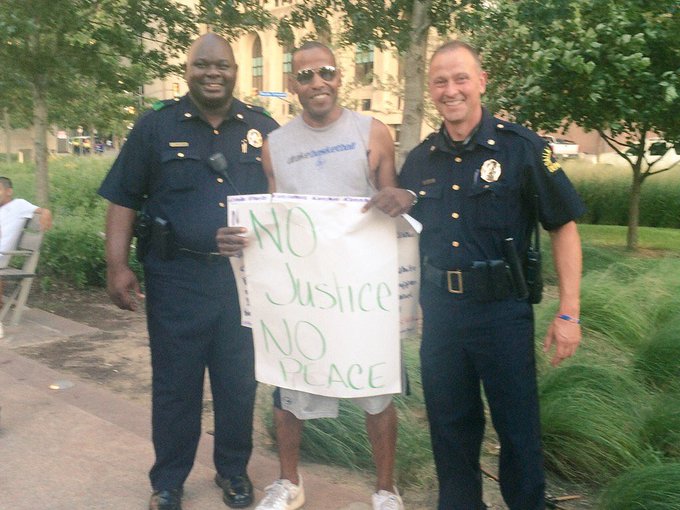The Violent Tone of Black Lives Matter Has Alienated Even Liberals Like Me
A Hispanic female officer stepped forward to take the man’s camera phone, while the protestor stood shoulder-to-shoulder with the police officers, his sign visible at his feet, a black police officer on his right and the white officer on his left, all smiling. Beside them, with friends and my son, I smiled. It was a moment of warmth in an unfortunate race war that has polarized America.
In town for a fencing tournament, we had stepped out of dinner moments earlier to the buzz of helicopters overhead. Emergency vehicles wailed nearby. A young man, hustling for money, told us folks were in downtown for a demonstration against police shootings of black men. “Be careful,” he said.
We followed others to the protest, crossing South Griffin Street, to enter the well-manicured Belo Garden Park, where a black man shouted into a megaphone, with about 500 protestors around him. My friend, who is Hispanic, was wary of possible danger, having grown up years ago amid violent anti-dictatorship protests.
We stopped when I spotted the line of police. “We’ll be safe next to the police,” I told my friend. It is a difficult truth to acknowledge: After watching the streets of America burn from Ferguson, Missouri, to Baltimore, we feared violence from the protestors, not the police. Little could we know, we were — metaphorically, at least — in the sniper’s line of fire, with targets on the backs of police, six of them to be injured, five of them to be slain, hours later.
In Belo Garden Park, studying the crowd of demonstrators, I had told my friend: The tenor of the Black Lives Matter movement — with headline moments of storming stages, seizing microphones, sabotaging a gay pride event, expressing rage and even hate to police — had alienated even liberals, like myself, who care deeply about racial justice.
To be sure, Dallas Police Chief David Brown said that the sniper, Micah Xavier Johnson, killed by a police robot with an explosive, had told police negotiators that he wasn’t affiliated with any organization, and the movement officially denounced the murders. But the killings in Louisiana, Minnesota, and Texas reveal there is a needle we must still thread as a nation. We must face the wounds of social injustice
with a nonviolent spirit of reconciliation and healing. When I expressed these sentiments on Twitter, not long after bullets flew blocks from where we had stood, some supporters of Black Lives Matter attacked me, particularly co=religionists from my Muslim community, using shaming techniques, like calling me “coon,” “racist,” “mental midget,” propagandist for Islamaphobia and now anti-Black racism,” to attempt to silence me and bully me to “f–k off.”
with a nonviolent spirit of reconciliation and healing. When I expressed these sentiments on Twitter, not long after bullets flew blocks from where we had stood, some supporters of Black Lives Matter attacked me, particularly co=religionists from my Muslim community, using shaming techniques, like calling me “coon,” “racist,” “mental midget,” propagandist for Islamaphobia and now anti-Black racism,” to attempt to silence me and bully me to “f–k off.”
Please open your heart to understand #BlackLivesMatters is too violent in tone for many people who care about racial justice@fifimcfae
That evening, before the sniper attack, the Dallas police department published the photo of the smiling protestor and police officers on Twitter. The photo of the three men, standing at Belo Garden Park, has become an iconic image from the day, a glimmer of hope in a day that ended with the Dallas Morning News running its next-day headline: “AMBUSH.”
As the nation reels, our collective response to this week’s grief must be to redouble our efforts to ensure the safety, wellbeing, and healing of all — not stoking hate, but planting flowers in our proverbial gardens.
Asra Q. Nomani is a former Wall Street Journal reporter and cofounder of the Muslim Reform Movement. She can be reached at asra@asranomani.com and on Twitter at @AsraNomani.



No comments:
Post a Comment